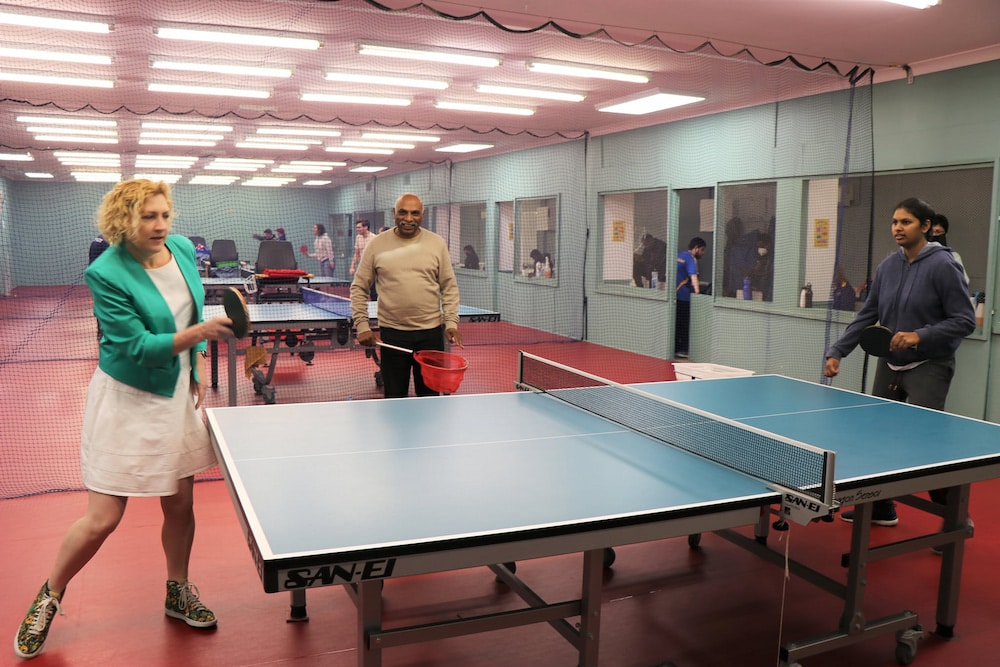The Canberra community is celebrating the International Day of People with Disability (I-Day) in diverse ways, from sport and entertainment to better legal assistance and support in the workplace.
“The diverse celebrations for I-Day this year is a testament to Canberra’s dedication to build a better normal with genuine inclusivity, where a person’s ability, sex, cultural background, or experience does not impact their access to participation,” said Emma Davidson, ACT Minister for Disability.
Normally, the Chief Minister’s Inclusion Awards would be held close to 3 December, as part of Canberra’s I-Day Celebrations, Ms Davidson said. The gala event will not happen this year, but the ACT Inclusion Council has a social media campaign highlighting how Canberrans have responded and supported people with disability. They will also release six videos highlighting positive and inclusive stories from Canberra over the past two years.
Table tennis
On the weekend, Ms Davidson played table tennis for the first time. Table Tennis ACT had launched their Diversity and Inclusion Plan to make the sport more accessible and inclusive for all.
Originally, the club intended to develop a Disability Inclusion Plan, but realised that Diversity and Inclusion better suited its needs.
“This broader focus better addresses intersecting barriers that people may face – such as gender, age, language, as well as physical or intellectual disability,” said Heather Tomlinson, the club’s president.
The club will host a week of table tennis activities to celebrate and promote table tennis as a sport for all abilities.
For more than 20 years, the club has run weekly programs such as Para Schools and Saturday Para coaching, thanks to volunteers like Arthur Wilks and Rosanna Horn.
As part of its Diversity and Inclusion Plan, Melissa (Milly) Tapper will be the Club Ambassador for 2022. Ms Tapper has represented Australia since 2012 at the Paralympics and Olympics, and won a silver medal at the recent Tokyo Para games.
The Plan was made possible by a government Disability Inclusion Grant, which provides funding of up to $20,000 to small businesses and not-for-profit community groups to remove barriers to participation. It funds activities and initiatives, such as disability training, awareness raising and related materials, assistive technology, and infrastructure modifications. The Grants have been extended until February.
‘Connect Collective’
Belco Arts’ ‘Connect Collective’ podcasts feature six Canberrans with disability talking about their hobbies, pastimes, and passions. Posters around Canberra and outside the Belconnen Arts Centre have a QR code linked to a podcast.
Disability advocate Craig Wallace will talk about Doctor Who; Woody Menzies about his love of cooking; Jenelle Outhwaite about environmental activism; Meg Kawada her love of music; and Moira Nelson provides insights into the world of refugees.
“This project captures everything that Belco Arts does at its best – investing in artists and communities, and celebrating the power of storytelling at its most raw and personal,” said Belco Arts’ Sammy Moynihan.
Each podcast is hosted by musician and performer Ruth O’Brien. “She brings a real sense of empathy and curiosity to her interviews,” Mr Moynihan said. “She’s brought out the best in all the interviewees, and really created a space for everyone to shine.”
The podcasts are available online at: www.belcoarts.com.au/connect-collective.
Music for Canberra will hold an I-Day Celebration 2021, sharing in the joy of music through activities, performances, and installations by Canberra artists, including artists with disability.
Legal advice
Canberra Community Law will launch a series of social scripts which will help people with autism, intellectual and psychosocial disability, anxiety, or low levels of English literacy access legal help.
Developed in partnership with Autism Spectrum Australia (Aspect), these are person-centred narratives used to introduce new events and interactions, said executive director / principal solicitor Genevieve Bolton. They use simple text and images to explain concepts and foreshadow emotions and what to expect from conciliation conferences and legal hearings.
“They are designed primarily for autistic people,” Ms Bolton said. “However, anyone who experiences anxiety that impairs their cognitive clarity, recall and memory, and communication, or people who have low literacy levels may benefit.”
Ms Davidson and Attorney-General Shane Rattenbury will attend the launch today. This project has been funded by the ACT Office for Disability.
Epilepsy ACT will soon host a webinar on ‘Epilepsy in the Workplace: Supporting Successful Careers’ to educate workplaces. A live recording of the webinar will also be available.
Read more:



